
An essential part of ensuring your 200K miles on car and beyond is regular maintenance. This doesn’t just mean getting an oil change when you remember or if a problem arises. Regular maintenance includes checking and replacing fluids, checking tire pressure and tread, replacing air filters, and ensuring your brakes are in good condition.
Regular oil changes: Oil lubricates the engine and reduces friction, which in turn reduces wear and tear. Changing the oil every 3,000 to 5,000 miles is a good rule of thumb.
Tire maintenance: Regularly checking tire pressure and tread can prevent damage and extend the life of your tires.
Brake check: Maintaining your brakes is also crucial. Worn out brakes can lead to costly repairs and dangerous driving conditions.

The Role of Quality in Car Longevity
Investing in quality parts and services can make a significant difference in your car’s lifespan. Quality is key when it comes to parts like batteries, tires, and brake pads. While it can be tempting to save money by choosing cheaper options, these can often lead to more frequent replacements and repairs, which can add up over time.
Quality batteries: A quality battery can last up to five years, while a cheaper one may need replacing after just three.
Durable tires: Investing in high-quality, durable tires can result in a smoother ride and longer tire lifespan.
Effective brake pads: High-quality brake pads can withstand higher temperatures and are less likely to warp or crack, leading to a longer lifespan and safer driving.
The Impact of Driving Habits
Your driving habits can significantly impact your car’s longevity. Aggressive driving, such as rapid acceleration and deceleration, can cause unnecessary strain on your vehicle.
Smooth driving: Aim for smooth transitions when accelerating, braking, and turning.
Limit short trips: Short trips can lead to more wear and tear on your vehicle, as your engine doesn’t have time to reach its optimum operating temperature.
Avoid heavy loads: Overloading your vehicle can also cause unnecessary strain on your vehicle’s engine and suspension system.
The Bigger Picture: Reaching 200K Miles on car
Reaching the 200K miles on car is about more than just regular maintenance and quality parts. It’s about understanding your vehicle and its needs. It’s about being proactive rather than reactive when it comes to maintenance and repairs.
Regular inspections: Regular inspections can help identify potential issues early before they become more serious (and expensive) problems.
Understand your vehicle: Take the time to read your vehicle’s manual and understand its specific maintenance needs.
Be proactive: Don’t wait for a problem to arise before addressing it. Regular check-ups and maintenance can prevent many issues from happening in the first place. It’s annual take the truck to the car wash today.

Introducing the Kilometer Stopper
The kilometer stopper from the Super kilometer filter is different from other correction tools in terms of convenience and reliability. It is a simple plug-and-play tool. You do not need soldering or cutting cables. It means that you can get back to the original condition when you don’t need it anymore. Moreover, it sifts out mileage data and stymies any supplementary facts from being passed on to other control computing systems. This is what made it completely untraceable. At Super Kilometer Filter, they ensure the reliability of the product and give you a guarantee that altered information remains undiscoverable at any rate.
Conclusion
Reaching the 200K miles on car is an achievement that brings with it a great sense of pride and satisfaction. It’s a testament to your commitment to maintaining your vehicle, understanding its needs, and making the necessary investments in quality parts and services.
Remember, the journey to 200K isn’t just about reaching a number; it’s about the experiences and memories you’ve made along the way. It’s about the road trips, the commutes, the late-night drives – it’s about the journey as much as the destination. And with the right care and attention, your car can continue to be part of your journey for many more miles to come.
Latest Posts
- 1
- 2
Is Buying a Car with Over 100k Miles a Good Idea?
April 10, 2024 - 3
Why Are High Mileage Cars So Expensive? – A Guide
April 5, 2024 - 4
Where Is The Mileage Located In A Car?
April 3, 2024 - 5
Whats High Mileage in Vehicles?
March 29, 2024 - 6
What’s The Gas Mileage On A Smart Car: A Comprehensive Guide
March 27, 2024 - 7
At What Mileage Should You Sell Your Car?
March 22, 2024 - 8
Should You Buy a Car with Over 100k Miles?
March 20, 2024 - 9
Should You Buy a Car with 100k Miles?
March 15, 2024 - 10
Understanding ODO Meaning in a Car
March 13, 2024








